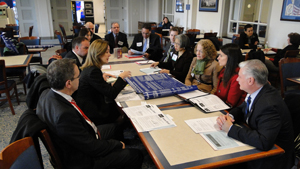by: Emily Nemens
In this issue:
· Grassroots 2011 — Capitol Hill Recap
· eCalendar
Grassroots 2011 — Capitol Hill Recap
By Jay Bond, AIANY Policy Director

The AIANY delegation met with Aixa Aleman Diaz, MPP, of Congresswoman Nydia Velazquez’s office. Joining them were AIA Queens President Michael Cosentino, AIA, AIA Brooklyn President Sebastian M. D’Alessandro, RA, AIA, AIA Queens Secretary Joseph Sultana, AIA Pamela Weston Associate Architect, Government Affairs Representatives from AIA Brooklyn, and AIA Regional Director Susan Chin, FAIA.
Laura Trimble
AIANY joined with our colleagues from across the nation at the 2011 Grassroots Leadership and Legislative Conference in Washington, DC. We convened for three days to empower our collective voice, speak with members of Congress, and share our vision of what America can be — through design.
We were all motivated by past successes from working with members of Congress, including the passage of the Qualifications Based Selection (QBS) in the federal sector, Energy Efficient Commercial Buildings Tax Deduction, Community Revitalization Tax Credit, and the inclusion of architectural services in the JOBS Act. This year, our delegation had scheduled meetings with the offices of Congresswoman Nydia M. Velazquez, Congresswoman Carolyn B. Maloney, and Congressman Jerrold Nadler. AIANY President Margaret O’Donoghue Castillo, AIA, LEED AP, also met with the offices of Senator Charles E. Schumer and Kirsten Gillibrand. At each meeting, we carried a message to our legislators: architects are problem solvers, and we want to work closely with them to solve our nation’s challenges. As designers of the built environment and as advocates for policies that help create stronger, healthier, and more sustainable communities, architects are committed to serving the public. The work architects provide to our industry accounts for one in nine dollars of U.S. Gross Domestic Product (GDP).
The Plan for Rebuilding Main Street
While many Americans are suffering in the current economic climate, architects and others in the design and construction industry have been particularly affected by this downturn. Since 2007, the number of workers in the architectural industry has dropped 18%. The hardest hit firms are small businesses: nearly 95% of architecture firms employ 50 or fewer people. With the 112th Congress focusing on improving the economy, we offered the AIA’s Plan for Rebuilding Main Street and asked our elected representatives for their support. The plan calls for action on four items to grow the economy and put architects to work, including: unfreezing credit to create jobs; removing regulatory burdens that hold small business back; jumpstarting the market for building retrofits as an engine of economic growth; and passing a transportation bill that gets communities moving again. Read more about these agenda items here: http://www.aia.org/advocacy/federal/index.htm.
Small Business Paperwork Mandate Elimination Act
Prior to starting our scheduled meetings, we received word that the Senate passed one of our agenda items, the Small Business Paperwork Mandate Elimination Act. Currently, businesses only have to send a Form 1099 to freelancers, contractors, or any consultants not receiving a regular wage or salary. However, beginning in 2012, this requirement would be expanded to include any corporation, vendor, contractor, or service provider that provides goods or services worth $600 or more. Essentially, businesses will have to get the tax identification number or Social Security Number of virtually every company and individual it does business with over the course of the year or face penalties. Without passage of this bill in the House of Representatives in the days and weeks to come, these new reporting requirements will go into effect. With our colleagues from around the country we will continue to push for passage in the House, insuring that architects don’t face overly harsh regulatory burdens in the coming years.
Fit Nation DC
We also shared information with our members of Congress on the first in a series of Fit Nation meetings held in Washington, DC, to discuss the design of communities, streets, and buildings and how it impacts health — particularly obesity. The conference brought together speakers from NYC who helped develop the Active Design Guidelines, as well as officials and Chapter leaders from Washington, DC. These nationwide conferences will continue to provide venues for sharing the interagency work that made our Fit City conferences so successful.
Solar Decathlon Update
In the last issue of e-Oculus, Jessica Sheridan, Assoc. AIA, LEED AP, wrote of her concern that the 2011 Solar Decathlon had been unexpectedly moved from the National Mall (See “Editor’s Soapbox: U.S. Department of Energy Sends Crushing Message to Architecture Students,” e-Oculus, 01.25.11). She was not the only one with concerns. AIANY President Castillo, and Executive Director Rick Bell, FAIA, wrote a letter to Secretaries Salazar and Chu on behalf of the Chapter urging them to reconsider the move. Meanwhile, 12 Senators, including NY Senator Gillibrand, have also written to Salazar and Chu asking for them to reevaluate the decision.
Although our agenda was positively received, our legislators cautioned that this budget cycle may be one of the most difficult in recent history. Cautioning us that it will be difficult to find new money in this economy, they also understood how important it is for the government to make smart investments in infrastructure while reducing regulatory burdens on business — especially now, as we try to grow the economy.
eCALENDAR
eCalendar includes an interactive listing of architectural events around NYC. Click the link to go to to eCalendar on the Web.








